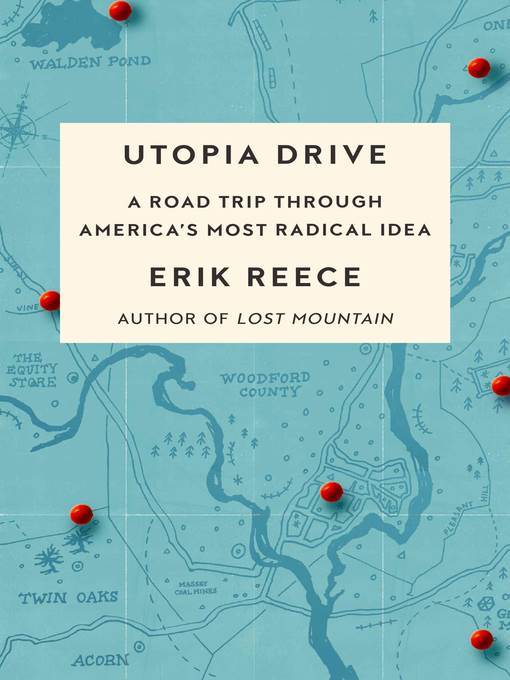
Utopia Drive
A Road Trip Through America's Most Radical Idea
کتاب های مرتبط
- اطلاعات
- نقد و بررسی
- دیدگاه کاربران
نقد و بررسی

June 13, 2016
Visionary hopes, eccentric beliefs, and hard work animate this impassioned history of and meditation on American utopian settlements. Environmental journalist Reece (Lost Mountain) tours sites of famous 19th-century intentional communities, including the Pleasant Hill, Ky., Shaker congregation, whose celibacy commandment channeled energies into making classic furniture; New Harmony, Ind., where industrialist Robert Owen built a benevolent socialist dictatorship; anarchist Josiah Warren’s Modern Times village on Long Island, N.Y., which used a “labor notes” currency denoted in working hours to banish exploitation; Thoreau’s Walden Pond, Mass., utopia of one; and the Oneida, N.Y., free-love commune of prophet John Humphrey Noyes. Reece also visits Twin Oaks, Va., a flourishing modern-day hippie commune. He regales readers with the colorful oddities and excesses of these groups, and warms to their feminism, anti-racism, and egalitarianism. The book examines utopian theories of what’s wrong with the world—capitalism, private property, egotism, either sex or monogamy—and Reece chimes in with Jeffersonian jeremiads against banks, consumerism, mass production, agribusiness, and genetic engineering, never registering how industry and technology make utopian aspirations practical. (His idea of paradise seems to be an organic farm with solar panels.) The result is an engaging exploration—and example—of the fruitful tunnel-visions of dreamers turned doers. Agent: Jin Auh, Wylie Agency.

June 1, 2016
A journalist and author drives his truck around the East visiting utopian communities--past and present--and concludes we need to think more like those folks.Currently a writer-in-residence at the University of Kentucky, Reece (An American Gospel: On Family, History, and the Kingdom of God, 2009, etc.) is, as he acknowledges, a restless soul who loves hopping in his truck and going where his considerable curiosity dictates. After a brief introduction to utopian thinking, the author chronicles his visit to Pleasant Hill, Kentucky, a former Shaker community. In this chapter, we see the pattern that characterizes the others: an intermingling of history with assessments of current status, riffs on why the community eventually failed, and thoughts on what we could learn from the utopians; later, he adds comparisons--e.g., how does community F differ from or resemble communities A-E? Some names serving as touchstones pop up continually: historian Walter Benjamin, poet Wendell Berry. Also popping up are some usage issues: a couple of instances of "revert back" and "sojourn" misused as a synonym for "journey." Reece is a most gracious guest during visits: respectful, inquisitive, and appreciative of the current community of Acorn (in Virginia), where nudity thrives. The places he profiles include the expected (New Harmony, Indiana; Oneida, New York) and some generally unfamiliar areas: Monk's Pond, in Kentucky; Utopia, Ohio--precious little remains; Utopia Parkway in Queens, New York). Throughout, Reece provides swift surveys of the lives of various principals: Thoreau at Walden Pond, Josiah Warren on Long Island, and Oneida's John Humphrey Noyes, who personally delivered the sexual initiation of girls in his community. Later, Noyes fled to Canada, pursued by a statutory rape charge, and Reece ends by following Noyes' route to Niagara Falls and ruminating about what he sees as our current ruinous economic and social policies. Compelling narratives with a personal voice, with some utopian political bite.
COPYRIGHT(2016) Kirkus Reviews, ALL RIGHTS RESERVED.

July 1, 2016
Environmental writer Reece (Lost Mountain) takes a road trip to explore the idea of utopia within the United States, past and present. In Reece's opinion, the country is facing unprecedented economic, environmental, political, and social crises. Change is the only option going forward, and it needs to be revolutionary, transforming how we view our environment, food, natural resource use, time, work, and more. For the author, these changes are modeled on the concepts and efforts of the varied utopian experiments in American history. This novel approach leads Reece to travel to a number of communities expressing different economic, family, political, religious, sexual, and social examples; some he finds necessary and adaptable to confront the current dilemma. He claims that these societies teach us which paths to take and which to avoid. Intriguingly, despite the dismal results of these utopian efforts, Reece remains hopeful that such endeavors should be applied to the nation at large. VERDICT Recommended for readers interested in travel writing, environmentalism, and U.S. history.--Scott Vieira, Rice Univ. Lib., Houston
Copyright 2016 Library Journal, LLC Used with permission.

Starred review from July 1, 2016
Reece (An American Gospel, 2009) takes us on a delightful road trip into the optimistic past of a unique form of American idealism. The early 1800s saw the proliferation of a widespread notion that life in this new world could be better, that the new continent deserved a society based upon something nobler, more uplifting than transplanted European industrialism. The philosophy of the day bore the newly coined term, socialism, and between 1820 and 1850, some two-hundred separate communities sprang up across the country. Following in the philosophical footsteps of the likes of Emerson, Thoreau, John Humphrey Noyes, and the Shakers, Reece visits the homes of these rugged individualists. Clearly, he's enamored of their dreams and their resolve, and he observes that whatever fault brought them down, it wasn't their embrace of socialism. Rather, it was the crush of an American consumer culture so unsustainable . . . that we now stand on the verge of both environmental calamity and an intractable federal plutocracy. Even as he acknowledges the failures of these communities, Reece is confident that we can learn from them and create a sustainable future. Hitching a ride on Reece's journey and catching his contagious optimism is entertaining and engaging.(Reprinted with permission of Booklist, copyright 2016, American Library Association.)

























دیدگاه کاربران